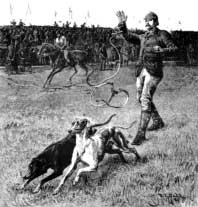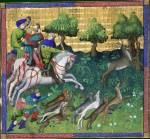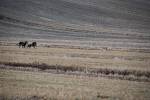Norfolkin herttuan tekemät coursingin säännöt ovat ensimmäiset varsinaiset viralliset säännöt, ja nykyaikainen coursing perustuukin niihin – puhuttiin sitten open field– tai park coursingista. Näillä säännöillä ei ole enää mitään tekemistä nykyajan kanssa. Brittiläisen, nykyään kielletyn, open coursingin sääntöjä muutettiin useasti ajan myötä, ja irlantilainen park coursing oli jo lähtökohdiltaan erilaisempi. Siinä ei ollut open field coursingin pistelaskusysteemiä ja periaatteessa nopein voitti. Mutta nämä säännöt ovat osa greyhound racingin historiaa. Lähtölaukaus eräällä tapaa.
- That he that is chosen Fewterer, or that lets loose the Greyhounds, shall receive the Greyhounds matched to run together, into his Leash as soon as he comes into the field, and follow next to the hare-finder, or he who is to start the hare until he come under form; and no horseman of footman is to go before, or on any side, but directly behind, for the space of about forty yards.
- You ought not to course a hare with more than a brace of Greyhounds.
- The hare-finder ought to give the hare three so-ho’s before he puts her from her form or seat, that the dogs may gaze about and attend her starting.
- Twelve score yards law ought to be given before the dogs are loosed, unless there be danger of losing her.
- The dog that gives the first turn, if after that there be neither cote, slip, nor wrench, wins the wager.
- If the dog gives the first turn and the other bears the hare, he that bears the hare shall win.
- A go-by, or bearing the hare, is equivalent to two turns.
- If neither dog turns the hare, he that leads last to the covert wins.
- If one dog turns the hare, serve himself and turn her again, it is as much as a coite, and a cote is esteemed two turns.
- If all the course be equal, he that bares the hare shall win, and if she be not borne, the course shall be adjudged dead.
- If a dog takes a fall in a course, and yet performs his part, he may challenge the advantage of a turn more than he gave.
- If a dog turns the hare, serve himself, and gives divers cotes, and yet in the end stands still in the field, the other dog, if he turns home of the covert, although he gives no turn, shall be adjudged to win the wager.
- If by misfortune a dog be ridden over in his course, the course is void, and to say the truth, he that did the miscief ought to make reparation for the damage.
- If a dog gives the first and last turn and there be no advantage between them, he that gives the odd turn shall win.
- A cote is when a Greyhound goeth endways by his fellow and gives the hare a turn.
- A cote serves for two turns, and two tripplings or jerkins for a cote; and if she turneth not right about she only wrencheth. The first version has it thus: A cote shall be more than two turns, and a go-by, or bearing the hare, equal to two turns.
- If there be no cotes given between a brace of Greyhounds and that the one of them serves the other as turning, then he that gives the hare the most turns wins the wager; and if one gives as many turns as the other, he that beareth the hare wins the wager.
- Sometimes the hare doth not turn but wrencheth, for she is not properly said to turn, unless she turns, as it were, round.
- He that comes in first to the death of the hare, takes her up and saves her from breaking, cherishes the dogs and cleanses their mouth from the wool, is judged to have the hare for his pains.
- Those that are judges of the Leash must give their judgement presently, before they depart the field.
Tekoälyn käännös
1. Se, joka on valittu koirien irtipäästäjäksi, ottaa vastaan vinttikoirat, jotka on määrätty juoksemaan yhdessä, heti kun hän saapuu kentälle, ja seuraa jäniksen löytäjää tai sitä, joka aikoo ajaa jäniksen liikkeelle, kunnes hän saapuu jäniksen makuulle; eikä yksikään ratsumies tai jalkamies saa mennä edelle tai sivuille, vaan suoraan taakse noin neljänkymmenen kyynärän matkan.
2. Ei tule ajaa jänistä enempää kuin kahdella vinttikoiralla.
3. Jäniksen löytäjän tulee antaa jänikselle kolme ”so-ho”-huutoa ennen kuin hän ajaa sen makuulta, jotta koirat voivat tähyillä ja valmistautua sen lähtöön.
4. Kaksitoista kymmenystä matkaa tulee antaa ennen kuin koirat päästetään irti, ellei ole vaaraa menettää jänistä.
5. Koira, joka antaa ensimmäisen käännöksen, voittaa vedon, ellei sen jälkeen ole yhtään ohitusta, liukua tai vääntöä.
6. Jos koira antaa ensimmäisen käännöksen ja toinen kantaa jänistä, se, joka kantaa jänistä, voittaa.
7. Ohitus tai jäniksen kantaminen vastaa kahta käännöstä.
8. Jos kumpikaan koira ei käännä jänistä, se, joka johtaa viimeisenä metsään, voittaa.
9. Jos yksi koira kääntää jäniksen, palvelee itseään ja kääntää sen uudelleen, se vastaa yhtä ohitusta, ja ohitus arvostetaan kahdeksi käännökseksi.
10. Jos koko ajo on tasavertainen, se, joka kantaa jänistä, voittaa, ja jos jänistä ei kanneta, ajo tuomitaan kuolleeksi.
11. Jos koira kaatuu ajossa ja silti suorittaa osuutensa, se voi vaatia etua yhdestä käännöksestä enemmän kuin se antoi.
12. Jos koira kääntää jäniksen, palvelee itseään ja antaa useita ohituksia, mutta lopulta pysähtyy kentälle, toinen koira, jos se kääntyy kotiin metsään, vaikka ei anna käännöstä, tuomitaan voittamaan vedon.
13. Jos koira epäonnisesti ratsastetaan yli ajossa, ajo on mitätön, ja totuuden nimissä, se, joka teki vahingon, tulisi korvata vahinko.
14. Jos koira antaa ensimmäisen ja viimeisen käännöksen eikä niiden välillä ole etua, se, joka antaa ylimääräisen käännöksen, voittaa.
15. Ohitus on, kun vinttikoira menee päätyyn toverinsa ohi ja antaa jänikselle käännöksen.
16. Ohitus vastaa kahta käännöstä, ja kaksi triplausta tai nykäystä vastaa ohitusta; ja jos jänis ei käänny oikealle, se vain vääntyy. Ensimmäinen versio sanoo näin: Ohitus on enemmän kuin kaksi käännöstä, ja ohitus tai jäniksen kantaminen vastaa kahta käännöstä.
17. Jos kahden vinttikoiran välillä ei anneta ohituksia ja toinen palvelee toista kääntämällä, se, joka antaa jänikselle eniten käännöksiä, voittaa vedon; ja jos yksi antaa yhtä monta käännöstä kuin toinen, se, joka kantaa jänistä, voittaa vedon.
18. Joskus jänis ei käänny vaan vääntyy, sillä sitä ei sanota kunnolla kääntymiseksi, ellei se käänny ikään kuin ympäri.
19. Se, joka saapuu ensimmäisenä jäniksen kuolemaan, ottaa sen ylös ja estää sen rikkoutumisen, hellii koiria ja puhdistaa niiden suun villasta, tuomitaan saamaan jänis vaivoistaan.
20. Ne, jotka ovat tuomareina hihnassa, antavat tuomionsa heti ennen kuin poistuvat kentältä.




